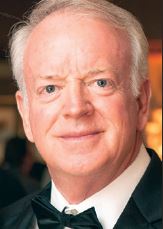Our industry is at war. We are fighting for the survival of our industry. It’s a war of public opinion, and now becoming a war of public policy. With the looming presidential election, the shift in public policy might be huge. What were once thought to be radical, “left wing ideas” are now being considered as viable options by a growing number of the world’s population. The science on global warming, now termed “climate change,” is considered by some to be “concluded and settled.” The vast majority feel there is no longer a need to discuss the view that global warming is causing the climate to become more extreme and that mankind and specifically the use of hydrocarbons are the primary cause. It’s being presented that hydrocarbons are bad for mankind and that we are running out of time to save the planet from soon becoming uninhabitable.
We in the oil and gas business must be vigilant in telling the story of our industry and we must become better educated on the issues that are being discussed by the opposition. Several tools that help us in waging this war are some well written books based on solid science and well-articulated logic. These books must be read by everyone in our industry and they must be incorporated into our daily speech as we defend our industry from the onslaught of misinformation and illogical thinking.
One of my favorite books, written in 2014, is Alex Epstein’s The Moral Case for Fossil Fuels. Epstein uses his exceptional debating skills to present the case that our main goal in society should be to increase “human flourishing” not to simply limit the amount of CO2 molecules in the atmosphere. The evidence clearly shows that having cheap, plentiful, reliable energy is the key to allowing humans to flourish. This can only be achieved through the consumption of hydrocarbons. While renewables have their place, they will not be able to meet the global demand for cheap, plentiful, reliable energy for the foreseeable future.
Another great resource is the recently released book Apocalypse Never: Why Environmental Alarmism Hurts Us All, written by Michael Shellenberger. Shellenberger, a life-long activist, became disillusioned by the flawed policies of green activists that are harmful not only to humans but to the environment as well. He is helping to start a movement called “ecomodernism,” which is the subject of the book. He still wants to help the poor and preserve the ecosystems, but through industrialization not through “sustainable development.” He considers most forms of renewable energy to be impractical for large-scale use. Windmills and solar power are too expensive and unreliable as a primary source of power for people in poor countries. He sees natural gas as one of the most viable options for the developing world.
The most recent tool in our arsenal of knowledge is the book False Alarm: How climate change panic costs us trillions, hurts the poor, and fails to fix the planet. By Bjorn Lomborg. A recent Tudor, Pickering, Holt & Co. video conference made me aware of this book and has moved it to the top of my “must read” list. Lomborg submits that humans are causing climate change (a premise that I think can still be debated), and that climate change over long periods of time can have negative environmental impacts that should be mitigated. He also argues that climate change is not the greatest threat to society, and that policies to limit the use of fossil fuels will cause far more harm to the peoples of the world and our environment than they will prevent.
As I stated at the outset, we are in a war of public opinion, and it appears that we are slowly losing. The oil and gas industry needs all of us to realize that we are soldiers in this battle and that we are all on the front line. Each day we interact with neighbors, friends, and even family members that are being influenced by the flood of misinformation coming from the media. We need to read all that we can and incorporate into our daily conversations a clear and concise response that shows the care and empathy we hold for the environment and more importantly for the humans that inhabit it. This isn’t just a fight for the future of our industry, but a fight for the future of human existence.












Excellent article with great references and points. We in the oil and gas industry must start doing a much better job of defending ourselves. For example, we should point out that oil and gas, by definition, are purely organic forms of energy, entirely natural – yet this is rarely mentioned. We need to point out how oil and gas are used to make hundreds of products, even life saving pharmaceuticals. We need to get our message out with media – videos for example, that highlight our history (we saved the whales), and how much humankind relies on oil and gas to support life and keep our planet clean. Perhaps we can convince Alex Epstein to produce a movie with help from our industry.